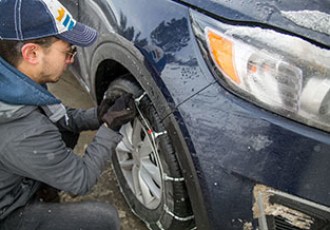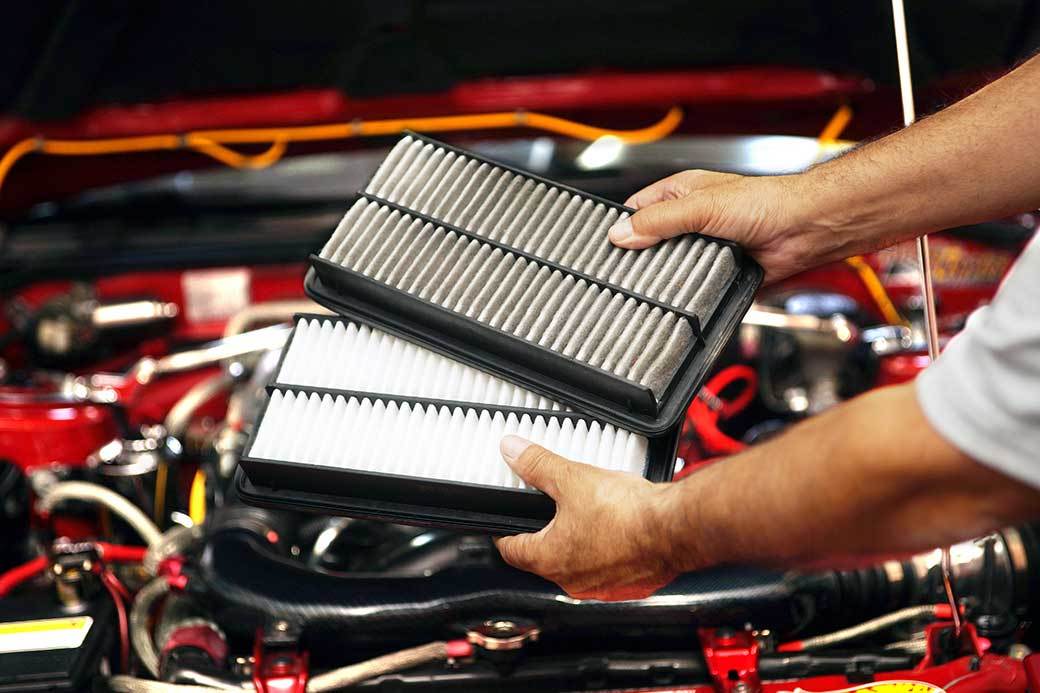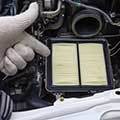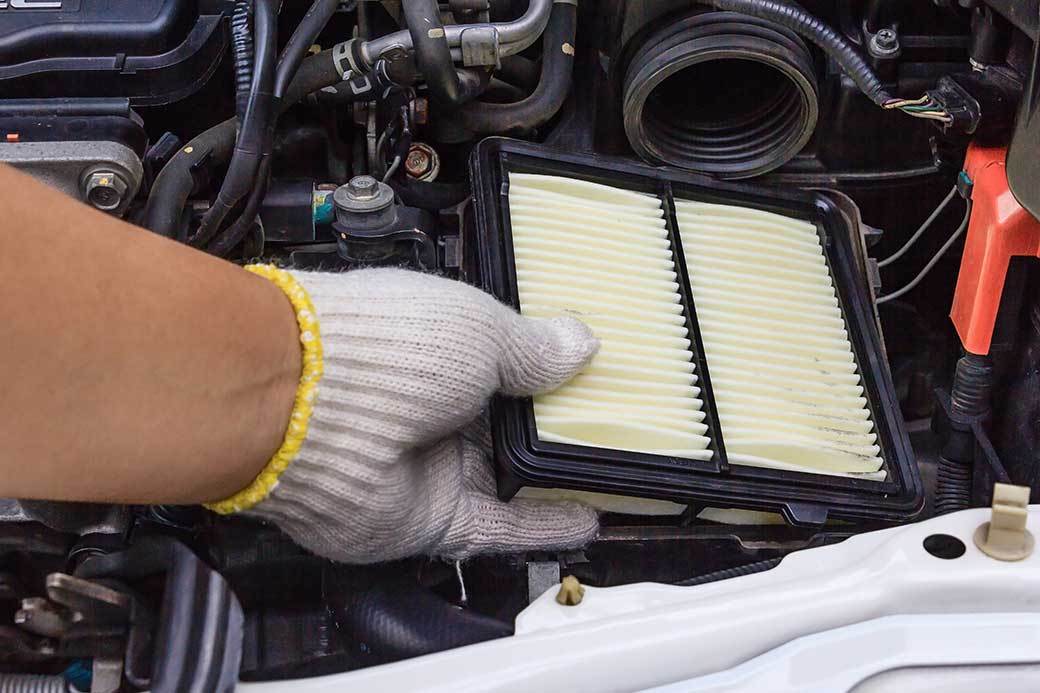BestReviews is reader-supported and may earn an affiliate commission. Details

A high-end, high-performance air filter that can be washed and reused for the life of your vehicle.
A high-end, high-performance air filter that can be washed and reused for the life of your vehicle.
Made with washable filtration media that's held in place with a metal screen. Comes pre-oiled for easy installation. Engineered to provide 50 percent more airflow than disposable paper filters. If cleaned properly and regularly, this filter can save you money in the long-term.
More expensive option.

This small air filter is a perfect choice for regular maintenance and costs far less than factory replacements.
This small air filter is a perfect choice for regular maintenance and costs far less than factory replacements.
This air filter protects your engine from dirt and other particulates at a great value. Expected lifetime is about 12,000 miles. Very easy to install without tools. Contains more pleats than factory equivalents in most cases. Surprisingly sturdy.
This filter is fairly shallow, so it may not filter as efficiently as other models.

The best type of filter if you own a Toyota or Lexus. Makes a good choice for Prius owners, who have more limited filter options.
The best type of filter if you own a Toyota or Lexus. Makes a good choice for Prius owners, who have more limited filter options.
A fine filtration mesh catches small dust and particles that can wear down engine components over time. This helps to protect more finely tuned engines often found in cars and hybrid vehicles. Factory fit makes installation easy and hassle-free.
Limited to specific Toyota models such as the Prius and RAV4.

The best engine air filter to choose when you desire premium performance at a good price point.
The best engine air filter to choose when you desire premium performance at a good price point.
This air filter uses extra-thick materials to nearly double the amount of filtration it provides to air entering the engine. Increases airflow and horsepower while improving engine performance. Thick enough to handle dirt, rocks, and other large natural debris.
Recommended for heavy engine use only.

This filter perfectly balances efficiency with performance and is manufactured to exceed factory quality specifications.
This filter perfectly balances efficiency with performance and is manufactured to exceed factory quality specifications.
This rectangular filter boasts excellent filtration properties while maintaining low-flow resistance. Designed to be robust and reliable even when under intense mechanical loads. Seals perfectly with factory equipment. Comes as a pack of two.
On the expensive side. Installation is more involved than with other filters.

We recommend these products based on an intensive research process that's designed to cut through the noise and find the top products in this space. Guided by experts, we spend hours looking into the factors that matter, to bring you these selections.


Updated January 2023
When people think of car maintenance, changing the engine’s oil is often one of the first things that comes to mind. What you may not realize is that keeping your engine’s air filter clean and maintained is just as important and can have a bigger day-to-day impact on your engine’s performance.
Combustion engines — whether gas or diesel — depend on the right ratio of fuel and air to function properly. An air filter cleans the air going into your engine, filtering out dust, dirt, debris and particles. Without a clean air filter, those particles and debris would make their way into your engine, rub against metal parts and cause extra wear. Particles and debris as small as a grain of sand can cause damage. If those particles make their way into your engine’s pistons and cylinders, they can result in damage that’s far more expensive than an air filter.
Even on a daily basis, a clean air filter helps your vehicle run better. If an air filter isn’t changed regularly, the dirt and debris it filters begins to clog it and restrict airflow. As the airflow is restricted, your engine’s air-to-fuel ratio is compromised, making your engine work harder to burn fuel and decreasing horsepower. If your air filter becomes dirty to the point of being clogged, it can create so much suction — as your engine tries to pull air through it — that large particles and debris can be sucked through the filter and pulled into the combustion chamber.


One of the biggest factors in choosing an air filter is whether it is disposable or reusable. The majority of air filters are disposable, designed to be changed every 10,000 to 30,000 miles, depending on the manufacturer. High-performance filters are often reusable and need to be cleaned and oiled every 30,000 to 50,000 miles.
On the surface, the idea of saving money and increasing performance by reusing a single, high-performance filter sounds good. The reality is a bit more complicated, and should factor in your decision. Independent studies have shown there’s little to no performance benefit from using an expensive, reusable filter. Worse, despite being sold as “performance” filters, some reusable products offer less filtration than cheaper, disposable ones, allowing more dirt to pass into the engine. If you’re strictly looking to save money over time — as opposed to buying it for additional performance gains — a reusable filter may be a good investment, as long as it’s filtration is on par.
When shopping for air filters, you should buy one specifically designed to fit your vehicle, as opposed to a generic filter designed to fit a broad group of vehicles. For an air filter to work properly, it needs to sit snugly in its compartment and create a seal around its edges. If it doesn’t, unfiltered air will make its way into the engine around the sides of the filter, creating the exact problems the filter is there to prevent. Filters designed specifically for your vehicle will be manufactured to strict tolerances, as opposed to a generic filter that may not be the exact size you need for a proper seal.


Air filters come in several different materials: paper, cotton and foam.
Paper is the most common material used in engine air filters, including those made by the majority of auto manufacturers. Paper filters are inexpensive, disposable, and very effective. The paper material is folded into pleats that allow a large amount of filtration to be packed into a small space.
Cotton is commonly used in aftermarket, reusable air filters. The cotton material is designed to be cleaned periodically. Depending on the brand and application, some cotton filters are supposed to be oiled after cleaning them. The oil traps smaller particles than the filter would normally be able to capture dry.
Foam is the third material often found in air filters. Because foam is more porous than paper or woven cotton, foam filters let more air through. In theory, because of foam’s internal structure, dirt and debris should still be trapped even though more air passes through. In reality, this will vary from one manufacturer to another.
Foam is also used to make air filter covers, an added layer of protection that can be used with a paper or cotton filter. Some experts recommend this option if you drive in extremely dusty environments.
Prices for air filters can range from $20 to over $100.
Inexpensive: Filters in this category will be disposable and made of paper. Don’t confuse inexpensive with low quality, however, as most of the filters auto manufacturers use are in this category. Prices will range from $10 to $20.
Mid-range: Mid-range filters incorporate woven materials, such as cotton, and are reusable. Many of the filters in this category are designed to go tens of thousands of miles. These filters will range in price from $20 to $50.
Expensive: High-end filters will be made of premium materials, or a combination of materials, and are designed to last hundreds of thousands of miles with proper cleaning and maintenance. Prices will range from $50 to upwards of $150.


Q. Do driving conditions affect when I change my air filter?
A. Absolutely. The manufacturer’s recommended change interval is based on “normal” driving conditions. If you frequently drive on unpaved, dusty roads or spend a lot of your time in heavy traffic in hot weather, you should change the filter around 10,000 to 12,000 miles.
Q. How much can a dirty air filter impact my car’s performance?
A. A study conducted for the U.S. Department of Energy in 2009 showed that a dirty filter can reduce acceleration by 6% to 11%.
Q. Does it hurt to change my filter sooner?
A. Not at all. As inexpensive as most filters are — and considering how much they impact your vehicle’s performance — it’s better to change them a little early than late.
Get emails you’ll love.
Learn about the products you’re wondering if you should buy and get advice on using your latest purchases.
